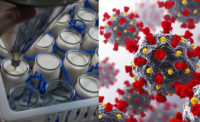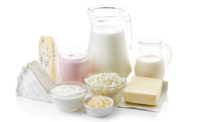Dairy execs weigh in on coronavirus-related efforts and challenges, Part 1
Dairy processors continue to operate as part of a subset of industries deemed essential to continued critical infrastructure viability.

As of March 26, 22 U.S. states had issued stay-at-home orders, and many “nonessential” businesses had closed. But food and beverage manufacturers, including dairy processors, continue to operate as part of a subset of industries deemed essential to continued critical infrastructure viability.
Dairy Foods asked high-level executives from a handful of well-known dairy processing companies about how these challenging times have impacted their operations. Participants include Mariano Lozano, CEO of Danone North America, White Plains, N.Y., and Broomfield, Colo.; Monica Massey, executive vice president and chief of staff with Dairy Farmers of America (DFA), Kansas City, Kan.; Stan Ryan, president and CEO of Darigold Inc., Seattle (with input from other top Darigold executives); Robert Denning, President and CEO of Perry’s Ice Cream Co. Inc.; Ed Mullins, CEO of Prairie Farms Dairy, Edwardsville, Ill.; and Patrick Criteser, president and CEO, Tillamook County Creamery Association, Tillamook, Ore.
What follows is Part 1 of the discussion. Part 2 will be published on Monday, March 30.
Dairy Foods: What steps have you taken within your dairy plants to mitigate the risk of coronavirus spread internally and externally?
Mariano Lozano: We are actively working to ensure safe working environments for all Danone North America employees at our locations, taking every precaution we can and strictly following guidance provided by the WHO, CDC, FDA and recommendations from government and local regulators. These precautions include increasing and deepening the level of cleaning and disinfecting, permitting only “business critical visitors” to enter facilities, postponing investment projects and trials to further cut down on visitors, and implementing a “no touch” policy for trucks visiting our plants.
Per our announcement, we also rolled out enhanced benefits to support our approximately 2,600 hourly employees working at our manufacturing sites and their families during this time. These benefits include a pay premium on top of their base hourly rate for all hours worked, paid quarantine leave for any employee who contracts the virus or is required to be quarantined at home, and up to 80 hours of pay for childcare support for eligible employees through April 30, 2020. These employees are truly our front-line heroes, and we are so grateful for their work in helping ensure shelves are stocked during this time of need.
Monica Massey: First off, employee health and wellbeing, as well as food safety, have always been top priorities for us at DFA.
In addition to our manufacturing plants’ ongoing food safety, quality and workplace safety programs, we have been working to ensure our entire supply chain — farmers, plant employees and haulers — have the most up-to-date information about COVID-19 and are following Centers for Disease Control recommendations.
While many of our employees are not able to work remotely, as they work in plants or in the field or on the road as haulers, as well as providing support in a variety of other positions, we’re taking steps to help protect them, their families and our business by enhancing our policies to help stem the spread of the virus. Some examples of practices we are employing include staggering work schedules to allow for social distancing and increased sanitation and disinfecting procedures, to name a few.
Stan Ryan: Darigold is committed to the health, safety and well-being of all our employees. To that end, restriction on travel was implemented in late February, as well as initial instructions about how to reduce the risk of infection and protecting others at work and home were provided to employees.
Darigold also activated its Pandemic Crisis Management Plan and Business Continuity Plan in response to the COVID-19 outbreak to protect our people and mitigate disruptions to our supply chain. These plans outline procedures across all of our processing plants, logistics network and Northwest Dairy Association member farms. They serve to immediately implement the appropriate social etiquette standards, social distancing practices, increased washing and disinfecting measures, restricting visitors and deploying work-from-home procedures to protect our employees, customers and consumers.
Darigold leaders who are responsible for executing the plans have been meeting regularly to assess risks, monitor the coronavirus situation and make daily adjustments to maximize the deployment of best health and safety practices.
We have been ramping up our precautions at our offices, logistics networks and plants to avoid further spread of the virus, keeping pace with or ahead of the CDC’s guidelines and local health authorities. We have been conducting health checks of all employees, including taking each person’s temperature, which has recently been implemented through our entire system.
In summary, we continue to monitor this coronavirus outbreak, checking regularly for updates from the CDC and local health authorities, and maintaining good communication with our employees and other stakeholders. For employees, we are holding regular town hall sessions and set up a dedicated resource center on our intranet.
Robert Denning: We have a Business Continuity plan and within that plan, we specifically address pandemic outbreaks such as the coronavirus. We follow Good Manufacturing Practices daily and are continually monitoring this evolving situation and following best industry practices related to the coronavirus, including:
- Collaboration with our peer group manufacturers, leading educators, and government state agencies.
- In accordance with our commitment to the health and wellness of our team members, customers, vendors and community, leaders are encouraged to prepare team members who can work from home to do so until further notice. This will minimize potential exposure and spread of illness and allow for greater social distancing among team members whose work must be conducted in our facility.
- Leadership-driven health checks for team members conducted daily and submitted to our HR team to take extra precautions for protecting the health and safety of our team; in addition, we are using our internal communications channels to:
- Educate team members about how the disease is spread, symptoms and best practices to avoid transmission.
- Encourage team members to self-report potential symptoms for themselves or family members.
- Remind team members of sick leave policies and encouraging them to stay at home if they feel ill.
Ed Mullins: Our plants follow Good Manufacturing Practices which are outlined by the U.S. Food and Drug Administration. These practices include employee wellness monitoring, use of gloves, proper handwashing and sanitizing foot baths at entry points to sensitive hygiene areas of our plants.
At our offices and branches, we’re providing alcohol-based hand sanitizers throughout the workplace, practicing social distancing and regularly disinfecting high-traffic areas of our building like elevators and restrooms. Cleaning sprays and wipes are also provided to disinfect frequently touched objects and surfaces such as doorknobs, telephones and keyboards. Frequent hand washing is encouraged at all of our facilities, and employees who are sick or showing flu-like symptoms are advised to contact their supervisor and stay home.
We have also implemented a Health Screening Questionnaire for visitors to our facilities. All visitors who have traveled internationally in the last 30 days are denied access.
Patrick Criteser: In times of crisis, people rely on the continued operations of critical infrastructure sectors like food production and agriculture, and at Tillamook, we take this special responsibility seriously. Our operations teams continue to come to work during the COVID-19 pandemic so we can keep our critical plants up and running, however we’re taking extra precautions to create the absolute safest work environment:
- We have implemented social distancing practices to give plant employees space between each other. This includes adjusting how we hold shift meetings and spacing out seating in break rooms.
- We maintain the high levels of hygiene that our team commits to day-in and day-out.
- We continue to clean and sanitize in the rigorous way we always do in our plants, including increased cleaning and sanitizing in common areas and break rooms.
- We are limiting any nonessential visitors, non-plant employees and tours of our plants.
Additionally, the Good Manufacturing Practices that are so well ingrained in our daily routines are creating the best possible environment to reduce the spread of this virus. The standards that protect the food we produce will also protect each of our manufacturing employees.
Dairy Foods: What are your greatest challenges as a dairy processor overall in relation to the coronavirus outbreak?
Criteser: From Tillamook’s perspective, we have seen a spike in demand as people stockpile food, but we are in constant communication with both our suppliers and customers and have been successful at keeping up with the accelerated sale of our products. To date, COVID-19 has not disrupted our ability to keep up with demand; we are filling customer orders at more than 98%. At the same time, we are in a highly volatile environment and could face disruptions or constraints to our supply chain, which is why we are contingency planning for potential challenges.
Another risk is workforce availability to manage production. We rely on our people to keep operations running, which is why we are taking the necessary measures to create the safest work environment possible.
Mullins: I think our greatest challenge at the moment is managing the panic buying. There’s no shortage of milk or dairy products from a production standpoint. Keeping store shelves stocked and stepping up to help retailers with shortages during this crisis is our main focus.
Denning: At times, some team members are appearing to show signs of mental fatigue and stress. As leaders, we need to slow down, listen to their feedback and share what we know at that point in time during this rapidly evolving situation. Perhaps, the constant news stories and the data related to the illness, hospitalization and death rates may also be adding to the team members’ fears, stress and loss of control during this crisis.
Our leadership team continues to meet daily to determine the ongoing adjustments necessary, yet there are still many unknowns. Consistent communication internally is key.
Additionally, I’ve started a weekly CEO inspirational message to all of our team members, focusing on the positive and sharing appreciation for their essential work through this time.
Ryan: By far, our largest challenge has been to take great care of our employees first and foremost, who then in turn take care of the critical dairy infrastructure that is essential to feeding America. As the COVID-19 pandemic has forced governments around the world to take swift action to curtail its spread, this has put pressure on our ability to consistently supply a vital source of nutrition for millions of people. Many international shipments have cancelled, which affects our ingredients export business.
Food is critical to health and sustenance, and this event may not be short in duration. In our consumer regions, hoarding and spike-buying have increased, and some shelves have been bare, which further exacerbates the situation. We have responded with increased shipments to multiple customers as their dairy stock has depleted. Our teams have been finding ways to meet urgent requests for orders to refill shelves quickly and meet the surge in demand for dairy consumer products.
Massey: This is a very dynamic situation that is changing rapidly, so we must be flexible and willing to adjust as needed. In the last couple weeks, we’ve seen increased demand for products in grocery stores as consumers stock up on key items due to sheltering-in-place orders and anticipation of self-quarantines.
To help meet this demand, we’ve added shifts at our plants, have employees who are working extra hours and are even hiring in some locations to help ramp up production. We’re also looking at what’s really needed right now, so we might be running more popular items and eliminating those that are less popular like milk in quarts and instead focusing on high-demand products like gallon and half-gallon jugs.
Lozano: Our team is making all decisions with three key objectives in mind: the safety of our colleagues, food safety and security of supply, and business continuity — all of which are more important now than ever. We remain vigilant, are closely monitoring the situation around the clock, and are prepared to make necessary adjustments as the situation evolves in order to ensure we’re doing everything we can to fight this pandemic, protect our employees and communities, and do our part to ensure that North America has access to healthy and nutritious food.
Looking for a reprint of this article?
From high-res PDFs to custom plaques, order your copy today!






